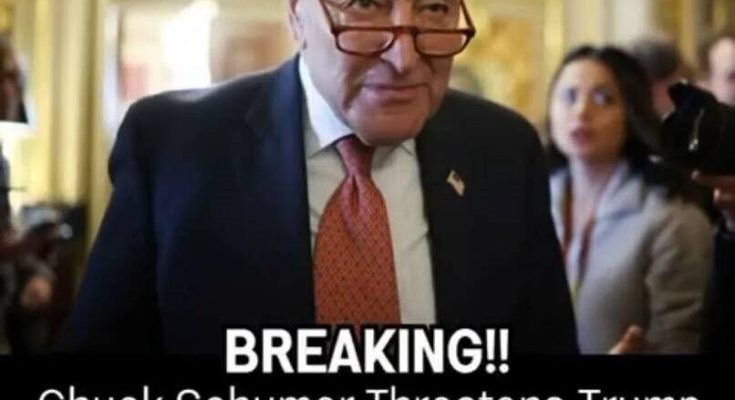WASHINGTON, D.C. — With just weeks to go before the federal government runs out of funding, Senate Majority Leader Chuck Schumer (D-NY) is drawing a hard line: if Republicans refuse to meet Democratic demands on health care and spending priorities, he is prepared to let the government shut down.
The warning marks a striking shift for Schumer, who earlier this year angered members of his own party by siding with Republicans to avoid a shutdown. That move sparked fierce backlash from the Democratic base, who accused him of caving to GOP pressure and betraying progressive priorities. Now, Schumer appears determined not to repeat the same mistake — even if it means risking the economic and political fallout of a shutdown.
A Changed Landscape
Speaking in an interview with the Associated Press on Thursday, Schumer insisted that “things have changed” since March, when he agreed to keep the government open by supporting a bipartisan funding bill.
At the time, Democrats were divided and wary of internal fractures. But the political environment has shifted dramatically since then. Schumer pointed to Republican-backed tax cuts and spending legislation signed by former President Donald Trump, which included reductions to Medicaid and other domestic programs. Those cuts, Schumer argued, have left Democrats unified in their opposition to further compromises.
“Back then, we weren’t all on the same page,” Schumer said. “Now, the Democratic Party is united. We are not going to allow Republicans to gut health care programs or strip away the protections that millions of Americans rely on.”
Aligning With House Leadership
Schumer also emphasized that he is working in lockstep with House Minority Leader Hakeem Jeffries (D-NY), who has taken a similarly aggressive stance. Both leaders have declared that Democrats will oppose any continuing resolution — the stopgap measure typically used to keep the government funded while negotiations continue — unless it includes firm protections for health care programs and assurances that those provisions cannot be rolled back.
“The message is simple,” Schumer said. “If Republicans want to keep the lights on in Washington, they will have to protect the health care of ordinary Americans. No gimmicks, no backroom cuts, no fake promises.”
What’s at Stake
At the center of the standoff are programs like Medicaid, subsidies under the Affordable Care Act, and broader federal spending priorities, including funding for foreign aid. Democrats argue that Republican tax cuts and spending reductions disproportionately benefit the wealthy while harming vulnerable populations.
Schumer framed the issue as a fight for basic fairness. “This isn’t about politics,” he said. “It’s about whether working families, seniors, and children can count on the care they need without fear of losing it to corporate giveaways and reckless cuts.”
Republicans, however, see the demands as overreach. They argue that Democrats are using the threat of a shutdown to force through spending that the country cannot afford. Many in the GOP are pushing for a short-term funding extension to buy more time for negotiations, but Schumer has signaled that Democrats will not accept a “clean” extension unless it locks in protections for health care.
The White House Factor
Schumer’s hardline approach has also raised questions about how it might affect relations with the White House, which he described as “already hostile.”
When asked whether forcing a shutdown would worsen tensions, Schumer dismissed the concern. “It will get worse with or without it, because Trump is lawless,” he said, making clear that he views confrontation with the former president and his allies as inevitable.
The comment underscores how much the looming funding battle is about more than just dollars and cents. It is also about defining the broader clash between Democratic leaders and the Trump-aligned Republican Party, which remains dominant in Congress.
The Risk of Shutdown
Allowing the government to shut down is always a gamble. Past shutdowns have had mixed political consequences, but they have consistently caused disruptions — from furloughed federal workers and closed national parks to delays in critical services.
Economists warn that even a short shutdown could ripple through the economy, particularly at a time when global markets are already jittery and inflation remains a concern. Federal workers, contractors, and families dependent on government programs would likely feel the effects almost immediately.
Yet for Schumer, the political calculus appears to favor taking a stand now rather than facing accusations of weakness later. “We are not bluffing,” one senior Democratic aide said. “The base won’t accept another compromise that sells out health care protections. Schumer knows his legacy is on the line.”
Republicans’ Next Move
Republicans, meanwhile, are weighing their options. Some in the GOP want to move quickly to pass a stopgap funding bill that would extend government operations beyond the September 30 deadline, buying time to negotiate a broader deal.
But others, particularly within the Trump-aligned faction of the party, are urging leadership to hold firm and resist Democratic demands. They argue that giving in now would set a dangerous precedent, emboldening Democrats to use the threat of a shutdown again in future negotiations.
“It’s a game of chicken,” one Republican strategist said. “The question is who blinks first — and what the political fallout will be if nobody does.”
A Repeat of 2013?
Some observers are drawing parallels to the 2013 government shutdown, which was triggered by Republican efforts to defund the Affordable Care Act. That standoff lasted 16 days and ultimately backfired politically, as polls showed the public blaming Republicans for the disruption.
This time, Democrats are betting the dynamic will work in their favor. By framing the fight around protecting health care and opposing tax cuts for the wealthy, they hope to cast themselves as defenders of working families while portraying Republicans as reckless.
Still, the outcome is far from certain. Voters’ patience for political brinkmanship has grown thin, and if a shutdown drags on, Democrats could face blame as well.
Conclusion
As the September 30 deadline approaches, Washington finds itself once again hurtling toward a familiar cliff. But this time, Chuck Schumer seems determined to prove that he will not back down, even if it means a government shutdown.
Whether his gamble pays off will depend on how firmly Republicans hold their ground, how much disruption a shutdown causes, and how voters ultimately assign blame.
For now, the stage is set for yet another high-stakes battle in a deeply divided capital — one where the stakes are not just about government funding, but about the future of health care, the balance of political power, and the willingness of leaders to risk chaos in pursuit of principle.

